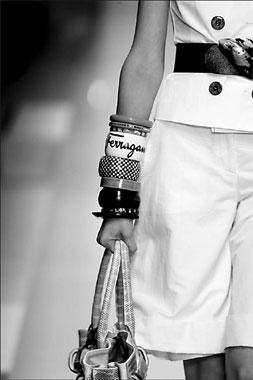 Brazilian customers are drawn to color and fur patterns and many top brands are beginning to take note. Here's a look from Salvatore Ferragamo's 2008 show in Milan. Giovanni Giannoni/WWD
Brazilian customers are drawn to color and fur patterns and many top brands are beginning to take note. Here's a look from Salvatore Ferragamo's 2008 show in Milan. Giovanni Giannoni/WWD
After years of political, social and economic instability, Brazil is emerging as one of the most promising markets for Italian luxury goods companies - and undoubtedly the most promising in South America.
With gross domestic product expanding by between 6 and 7 percent a year, and an increasingly affluent customer base, Brazil is a growing draw for many brands seeking to offset slowing, or downright stalled, sales in more developed markets.
Brazil is seen as one of the industry's main emerging markets, which also includes Russia, India and China, and is commonly referred to as BRIC.
Leveraging a stable political situation; a wealth of natural resources, from natural gas to wood; steady population growth; a strong currency, and a rigorous fiscal strategy that has helped the country emerge from its national debt, Brazil is now focused on building its retail infrastructure to measure up to international luxury standards.
While Brasilia is the actual capital and Rio de Janeiro attracts a large number of international visitors, the city of Sao Paulo serves as the country's de facto capital. There are 20 million people living in the greater Sao Paulo area, making it the third largest metropolis in the world.
"There's been a continuous and constant development for the past two years," says Vittorio Missoni, who oversees institutional affairs at the family-owned company. Missoni says Brazil is one of the most ebullient markets for the brand, which fits in especially well with Brazilian customers drawn to colors and fun patterns.
"They love clothes, especially more casual, easy looks," says Missoni, whose family company opened a shop-in-shop in the new NK Store in Sao Paulo in the fall. Business is still mainly concentrated in Sao Paulo, where a large number of multinational firms and diplomatic offices are located.
The victory of left-wing politician Luiz Inacio Lula da Silva in the presidential elections in 2002 over right-wing Fernando Henrique Cardoso created a wave of positive developments in the country, according to John Hooks, commercial and marketing director at Giorgio Armani. "I went back last spring after six or seven years and was impressed by how much more confidence, wealth and merchandise there is," says Hooks.
In August, the company opened a Giorgio Armani boutique in Cidade Jardim. The designer already is well established in the country, with two Giorgio Armani and Emporio Armani stores in Sao Paulo and an Emporio Armani in Rio de Janeiro.
"Brazilians are big spenders - they are considered the Russians of South America," says Hooks, who also notes that, from the company's tax refund data, he sees more Brazilians spending in the brand's Paris and London stores than in the past.
Gucci opened its first directly owned flagship in Sao Paulo in November, at the Iguatemi mall. "It's a milestone move for us," says Gucci president and CEO Mark Lee. "We've been monitoring (the country) for the last few years. It's always a matter of location and timing, and now we have found enough space to present the full collection.
"Brazil has solid GDP and there's excitement," he adds.
Lee says the main obstacle for business in Brazil is the very high import taxes and restrictive barriers that protect local producers and push up retail prices of foreign goods by 60 to 70 percent. However, these rules are changing under the government of President da Silva.
Still, the high taxes and other barriers are among the issues that make some companies still cautious about Brazil.
Cristiana Ruella, Dolce & Gabbana's director of general affairs, said the country's protectionist strategies are preventing the company from entering the market with more directly owned stores. "Yes, it's a market that we are looking at closer, and it's very ebullient, but we are not going to enter directly until the rules change," says Ruella.
Prada chairman Patrizio Bertelli was equally careful, while aware of the high growth potential. "Brazilians have a strong relationship with high-end quality products in all sectors, not only fashion," says Bertelli.
"There are the conditions for this market to bloom, and our development in Brazil is on our agenda, but new openings remain subordinate to the definition of spaces and commercial contexts in line with our brands," he says. Prada has one store in Sao Paulo, which opened in 2005.
While some brands remain hesitant about expanding in Brazil, the consensus is that the market offers a consumer base that is "very interesting" for luxury goods brands and that "(loves) jewels, for example," says Armando Branchini, deputy chairman of Milan-based luxury goods consultancy, Intercorporate.
Branchini praises Brazil's "great" universities and the social evolution of the country over the past 30 years, with a new group of professionals and managers.
"There is a learning curve, and it's a market that has only recently opened up, so one of the priorities is to recruit qualified personnel," Branchini stresses. "But if the economy continues like this, as is commonly forecast, the perspective is a growth between 7 and 9 percent a year."





